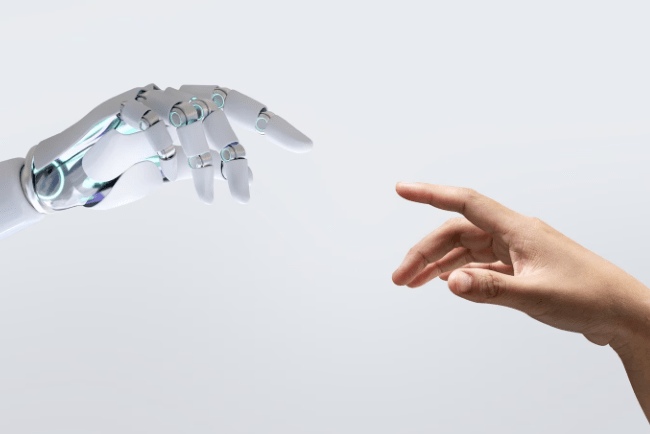
Artificial Intelligence (AI) is ushering in a new era of multilingual content creation, enabling businesses to communicate with consumers worldwide effectively. This innovative technology is transforming the landscape of global business interactions, breaking language barriers, and fostering a more inclusive and accessible marketplace. AI’s ability to quickly and accurately translate content into multiple languages opens up new markets and opportunities, allowing businesses to connect with diverse international audiences like never before. In this article, we will explore how AI is fueling the creation of multilingual business content and the immense opportunities it presents for global reach and inclusivity.
The Evolution of AI in Language Translation
The relationship between AI and language translation has come a long way from its primitive beginnings. Initially, translation software was a rule-based system that relied heavily on dictionaries and linguistics rules, often resulting in technically accurate translations that lacked context and cultural nuances. The advent of Machine Learning (ML) enhanced translation capabilities significantly, with systems learning complex linguistic patterns over time and adapting to context. More recently, the emergence of Neural Machine Translation (NMT), a subtype of ML, has been a game-changer. NMT uses deep learning algorithms to consider the full context of a sentence and generate more natural, human-like translations. This evolution of AI in language translation has enhanced the quality and efficiency of translations and opened up possibilities for real-time translation, making global communication more seamless than ever.
Impact of AI on Multilingual Content Creation
Artificial Intelligence has been a powerful catalyst in the sphere of multilingual content creation. It has enhanced the efficiency of content translation and played an instrumental role in preserving and respecting linguistic diversity and cultural nuances. AI-powered translation tools can learn and adapt, which allows them to understand context, idioms, and regional dialects, resulting in more accurate and culturally sensitive translations. It has immensely enriched multilingual content, making it more relatable and accessible to global audiences.
Furthermore, AI’s capability of translating content quickly and at scale allows businesses to rapidly deploy their messages to audiences worldwide, effectively reducing the time-to-market and driving global growth. However, while AI has certainly revolutionized multilingual content creation, it is essential to remember that it is a tool that assists human effort, and the importance of human oversight in ensuring the accuracy and cultural appropriateness of translated content cannot be understated.
AI and Global Business Interactions
As businesses expand their operations globally, the intelligent assistance of AI has become indispensable. It offers the ability to conduct business seamlessly across linguistic borders and cultural divides, enhancing international customer relations. When it comes to customer support, for instance, AI-powered chatbots can communicate with customers in their native language, providing immediate and accurate responses. It improves customer satisfaction and allows businesses to operate around the clock, thus expanding their global reach.
Moreover, AI can analyze customer behavior and preferences across different regions, thereby helping businesses tailor their products and services to meet diverse cultural expectations and market demands. Such personalization strengthens customer loyalty and drives business growth. Furthermore, AI’s ability to process large volumes of data in multiple languages enables businesses to gain insights from international customer feedback, which can be instrumental in strategic decision-making.
Unleashing New Markets and Opportunities
AI-powered multilingual content creation opens doors to vast new markets and opportunities. By breaking down language barriers, AI enables businesses to penetrate deeper into existing international markets and explore untapped ones. With AI, even small businesses can create content in multiple languages, thereby reaching out to diverse consumer bases previously inaccessible due to language limitations.
AI provides the flexibility to adapt marketing strategies and campaigns to suit different languages and cultures. Businesses can now efficiently create culturally appropriate and highly localized content, providing their international consumers with a more personalized experience. It enhances customer engagement and fosters brand loyalty, paving the way for sustainable global business growth.
A case in point is a multinational technology company that expanded its reach in Asia by leveraging AI to translate and localize its content. By doing so, they could effectively engage with their customer base, resulting in increased sales and brand recognition in the region.
Moreover, AI’s ability to translate user-generated content, such as consumer reviews and social media posts, empowers businesses to better understand their international customers’ needs and preferences, thereby making informed business decisions and strategies. Indeed, the era of AI-enabled multilingual content is revolutionizing global business, blurring geographical boundaries, and fostering a truly global marketplace.
The Future of AI in Multilingual Content Creation
The future of Artificial Intelligence in multilingual content creation holds immense promise and potential. As AI algorithms learn and improve, we can expect even more accurate translations that capture cultural nuances and local idioms with a depth and sensitivity previously unimaginable. Additionally, the emergence of an AI writing detector, which can detect AI content and distinguish it from human-written material, will help to ensure that translated content maintains the same level of quality as its source material. An ai rewriter can can certainly be a powerful tool in the content creation process while ensuring consistency across various languages.
Moving forward, we can anticipate a surge in real-time translation services, further enhancing global communication and interaction. It will fundamentally transform business conferences, diplomatic negotiations, and even everyday conversations, bridging gaps and fostering understanding in a world of diverse languages.
Moreover, the AI’s ability to handle large volumes of multilingual data will help businesses gain deeper insights into regional consumer behaviors and preferences. This, in turn, will enable hyper-personalization of products, services, and marketing strategies, thereby elevating the customer experience and driving business growth.
While technology is advancing, it must continue to function alongside human effort. The human touch will always be necessary to validate the cultural appropriateness of translated content and provide the empathy and understanding that AI cannot replicate despite its advancements. As we step into the future, the harmonious collaboration of AI and human expertise will usher in a new era of multilingual content creation, empowering businesses to reach new heights in the global marketplace.



